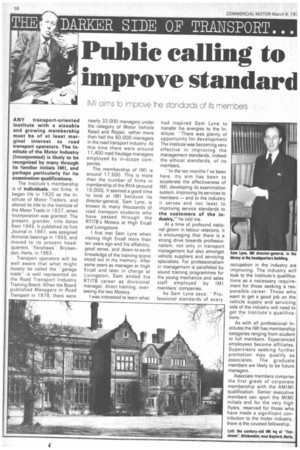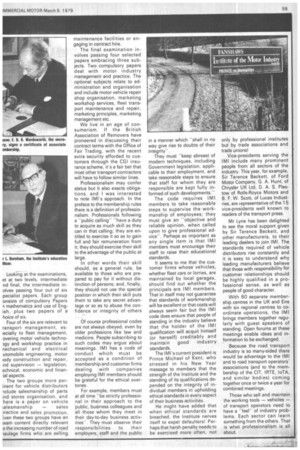Public calling to improve standard
Page 60

Page 61

If you've noticed an error in this article please click here to report it so we can fix it.
I aims to improve the standards of its members
ANY transport-oriented institute with a sizeable and growing membership must be of at least marginal interest to road transport operators. The Institute of the Motor Industry (Incorporated) is likely to be recognized by many through its familiar initials IMI, and perhaps particularly for its examination qualifications.
The Institute's membership is of individuals, not firms. It began life in 1920 as the Institute of Motor Traders, and altered its title to the Institute of the Motor Trade in 1927, when Incorporation was granted. The present, grander, title dates from 1945. It published its first Journal in 1947, was assigned Armorial bearings in 1955, and moved to its present headquarters, "Fanshaws", Brickendon, Herts, in 1963.
Transport operators will be well aware that what might loosely be called the "garage trade" is well represented on the Road Transport Industry Training Board. When the Board published Managers in Road Transport in 1978, there were nearly 32,000 managers under the category of Motor Vehicle Retail and Repair, rather more than half the 60,000 managers in the road transport industry. At this time there were around 11,400 road haulage managers employed by in-scope companies.
The membership of IM I is around 17,500. This is more than the number of firms in membership of the RHA (around 15,000). It seemed a good time to look at IMI because its director-general, Sam Lyne, is known to many thousands of road transport students who have passed through the RTITB's Motecs at High Ercall and Livingstone.
I first met Sam Lyne when visiting High Ercall more than ten years ago and his affability, good sense, and down-to-earth knowledge of the training scene stood out in my memory. After some years as manager at High Ercall and later in charge at Livingston,. Sam ended his EITITB career as divisional manager, direct training, overseeing the two Motecs.
I was interested to learn what had inspired Sam Lyne to transfer his energies to the Institute. "There was plenty of opportunity for development The Institute was becoming very effective in improving the management standards, indeed the ethical standards, of its members.
"In the ten months I've been here, my aim has been to accelerate the effectiveness of IMI, developing its examination system, improving its services to members — and to the industry it serves and not least to improving service standards to the customers of the industry," he told me.
At a time of profound national gloom in labour relations, it is encouraging that there is a strong drive towards professionalism, not only in transport management but also amongst vehicle suppliers and servicing specialists. For professionalism in management is paralleled by sound training programmes for the young mechanics and sales staff employed by IM I members' companies.
As Sam Lyne says: "Professional standards of every occupation in the industry are improving. The industry will look to the Institute's qualifications as a necessary requirement for those seeking a responsible career. Those who want to get a good job on the vehicle supply and servicing side of the industry will need to get the Institute's qualifications.'' As with all professional Institutes the IMI has membership categories ranging from student to full members. Experienced employees become affiliates. Supervisors seeking further promotion may qualify as associates. The graduate members are likely to be future managers.
Associate members comprise the first grade of corporate membership with the AMIMI qualification. Senior executive members can sport the MIMI initials and for the very high flyers, reserved for those who have made a significant contribution to the motor industry, there is the coveted fellowship. Looking at the examinations, et at two levels, intermediate nd final, the intermediate in()Ives passing four out of six pecialist papers. Each group onsists of compulsory Papers -1 mathematics and use of Engish, plus two papers of a hoice of six.
Four of the six are relevant to ransport management, eslecially to fleet management, overing motor vehicle techno)gy and workshop practice in nechanical and electrical lutomobile engineering, motor iody construction and repair, Ind supervision — legislation, echnical, economic and finanial aspects.
The two groups more perinent for vehicle distributors -iclude salesmanship of parts Ind stores organisation, and here is a paper on vehicle
ialesmanship sales )ractice and sales promotion. Even these two groups have an :xam content directly relevant o the increasing number of road -haulage firms who are selling
maintenance facilities or engaging in contract hire.
The final examination involves passing four selected papers embracing three sub jects. Two compulsory papers deal with motor industry management and practice. The optional subjects relate to administration and organisation and include motor vehicle repair shop organisation, marketing workshop services, fleet trans port maintenance and repair, marketing principles, marketing management etc.
We live in an age of consumerism. If the British Association of Removers have pioneered in discussing their contract terms with the Office of Fair Trading, with the recent extra security afforded to customers through the CG1 insurance scheme, it's a fair bet that most other transport contractors will have to follow similar lines.
Professionalism may confer status but it also exacts obligations, and I was interested to note IMI's approach. In the preface to the membership rules there is a definition of professionalism. Professionals following a "public calling" "have a duty to acquire as much skill as they can in that calling; they are entitled to exercise it so as to gain full and fair remuneration from it; they should exercise their skill to the advantage of the public at large.
In other words their skill should, as a general rule, be available to those who are prepared to pay for it without distinction of persons; and, finally, they should not use the special position in which their skill puts them to take any secret advantage or so as to abuse the confidence or integrity of others Of course professional codes are not always obeyed, even by older professions like law and medicine. People subscribing to such codes may argue about meanings. IMI has a code of conduct which must be accepted as a condition ot membership and customer firms dealing with companies employing IM1 members should be grateful for the ethical overtones.
For example, members must at all time -be strictly professional in their approach to the public, business colleagues and all those whom they meet in their day-to-day business activities-. They must observe their
responsibilities to their employers, staff and the public in a manner which "shall in no way give rise to doubts of their integrity".
They must "keep abreast of modern techniques, including Government legislation, applicable to their employment, and take reasonable steps to ensure that staff for whom they are responsible are kept fully informed of such developments."
The code requires IMI members to take reasonable steps to supervise the workmanship of employees; they must give an -objective and reliable opinion, when called upon to give professional advice". Perhaps as important as any single item is that IMI members must encourage their staff to raise their educational standards.
It seems to me that the customer firms whose vehicles, whether fleet cars or lorries, are maintained by local garages, should find out whether the principals are IM1 members. That in itself may not guarantee that standards of workmanship will be excellent or that costs will always seem fair but the IM I code does ensure that people of standing in the industry believe that the holder of the IMl qualification will acquit himself (or herself) creditably and maintain good industry standards.
The IMI's current president is Prince Michael of Kent, who stressed in his New Year message to members that the strength of the Institute and the standing of its qualifications depended on the integrity of individual members in upholding ethical standards in every aspect of their business activities.
He might have added that when ethical standards are breached, the Institute nerves itself to expel defaulters! Perhaps that harsh penalty needs to be exercised more often, not only by professional institutes but by trade associations and trade unions!
Vice-presidents serving the IMI include many prominent people from all sectors of the industry. This year, for example, Sir Terence Beckett, of Ford Motor Company, G. A. Hunt, of Chrysler UK Ltd, D. A. S. Plastow of Rolls-Royce Motors and B. F. W. Scott, of Lucas Industries, are iepresentative of the 15 vice-presidents well known to readers of the transport press.
Mr Lyne has been delighted to see the moral support given by Sir Terence Beckett, and other manufacturers, to their leading dealers to join IMl. The standards required of vehicle distributors rise constantly and it is easy to understand why leading manufacturers believe that those with responsibility for customer relationships should be highly qualified in a professional sense, as well as people of good character.
With 60 separate membership centres in the UK and Eire with six regional centres to coordinate operations, the IM I brings members together regularly with guest speakers of standing. Open forums at these meetings enable ideas and information to be exchanged.
Because the road transport industry is so many-sided there would be advantage to the IMl and to road transport operators' associations (and to the membership of the CIT, IRTE, loTA, and similar bodies) coming together once or twice a year for combined meetings.
Those who sell and maintain the working tools — vehicles — of transport operators need to have a "feel" of industry problems. Each sector can learn something from the others. That is what professionalism is all about.












































































































